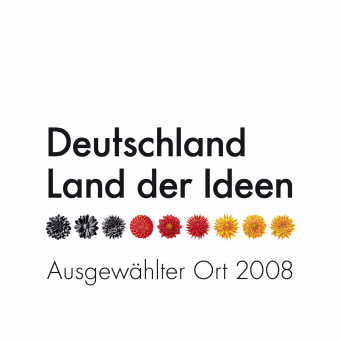On August 26, the Karlsruhe Institute of Technology (KIT) will be granted the award “Ausgewählter Ort” (selected place) in the Land of Ideas for its international Karlsruhe Tritium Neutrino Experiment (KATRIN). These most precise scales in the world shall be used to determine the mass of smallest particles, neutrinos. Neutrinos play an important role in investigating the origin of mass and designing visible structures in the universe. The cup and the certificate signed by Federal President Horst Köhler will be handed over to the KIT during a presentation of the Karlsruher Kinder-Uni (Karlsruhe Children’s University) and a subsequent visit of KATRIN.
The awards ceremony will take place on Tuesday, August 26, 9.30 hrs, at the Center for Advanced Technological and Environmental Training of the Forschungszentrum Karlsruhe and open a presentation of the Karlsruhe Children’s University. The cup and certificate will be handed over to the Chairman of the KIT Executive Board, Professor Dr. Eberhard Umbach, by Frank Arlaud from the Deutsche Bank. Then, Professor Dr. Guido Drexlin will present “The Most Precise Scales in the World”. Following this presentation, the children and accompanying persons will have the opportunity to visit KATRIN. The roundabout 400 tickets for the event are sold out.
About 1500 places and ideas competed for “365 Orte im Land der Ideen” (365 places in the land of ideas). This competition was launched three years ago by the initiative “Deutschland – Land der Ideen” and the Deutsche Bank under the auspices of Federal President Horst Köhler.
With the KATRIN presentation, the second half of the Karlsruhe Children’s University will start. In the first two weeks, 2600 little students participated in presentations and workshops. They studied clouds, rivers, and heredity, tested heart and muscles, worked at a chemical laboratory, and composed a hit. On Thursday, August 28, a bilingual presentation will follow for the fourth time: Dr. Klaus Dullenkopf will explain to young researchers from Germany and Alsace how a jumbojet flies. The last two presentations will then be tricky and delicious: On Tuesday, September 2, Dr. Stefan Kühnlein and Thomas Willging will explain how codes work. In the final presentation on Thursday, September 4, the children will try to produce chocolate together with Professor Heike Schuchmann. Tickets for these events are available at EUR 1 at the offices of the Badische Neueste Nachrichten and Buch Kaiser (on Kaiserstraße).
The Karlsruhe Institute of Technology (KIT) is the merger of the Forschungszentrum Karlsruhe, member of the Helmholtz Association, and the Universität Karlsruhe. This merger will give rise to an institution of internationally excellent research and teaching in natural and engineering sciences. In total, the KIT has 8000 employees and an annual budget of 700 million Euros. The KIT focuses on the knowledge triangle of research – teaching – innovation.
The Karlsruhe institution is a leading European energy research center and plays a visible role in nanosciences worldwide. KIT sets new standards in teaching and promotion of young scientists and attracts top scientists from all over the world. Moreover, KIT is a leading cooperation partner of industry.

